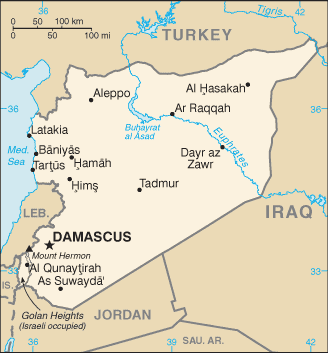Clashes between Syrian government forces and insurgent groups continued in major cities like Homs and Damascus, as UN peace envoy Kofi Annan stressed that there can be no deadline placed on when the crisis would end.
 Syrian activists claimed dozens of people – both combatants and civilians – were killed in the fighting. A call for a ceasefire from the UN has not been heeded and Annan’s diplomatic overtures have so far been rejected by all sides in Syria.
Syrian activists claimed dozens of people – both combatants and civilians – were killed in the fighting. A call for a ceasefire from the UN has not been heeded and Annan’s diplomatic overtures have so far been rejected by all sides in Syria.
While most powers have rhetorically lent support to Annan’s mission to reach a political settlement and end the violence, they continue to craft their own policies that are probably prolonging the conflict. Russia, even after endorsing the Annan talks, continues to arm and support the regime of President Bashar al-Assad.
The U.S. has also praised the peace process, but announced on Sunday their plan, along with Turkey, to send “non-lethal” aid to the Syrian rebels. In fact, Washington had already announced that it had been providing humanitarian aid to opposition fighters and administration officials confirmed on Sunday that the U.S. had already begun to supply some aid, including communications gear, to the rebel Free Syrian Army.
No authority from Congress or any international body was sought before the Obama administration decided to formally involve the U.S. in a civil war in Syria. Agreeing to give non-military aid to the Syrian opposition drastically increases the likelihood that substantial military assistance, from the U.S. or some other allied country, will soon be introduced. This opens the floodgates for yet another war of choice by the Obama administration.
Allying with the rebel fighters in a bid to oust the Assad regime is a grave mistake for the U.S. The opposition is unorganized, has itself committed serious crimes, and contains elements of religious extremists. Using them as a proxy to topple the Assad government seems tactically impossible and strategically dangerous, considering they have no capacity to form a government post-Assad. Syria would descend into chaos.
Syria still receives too much support from Russia, including sophisticated air-defense systems that could at least partially stand up to U.S. aggression, for the Obama administration to openly embrace bombing. And the sectarian cleavages in the country would guarantee an Iraq-style civil war, costing hundreds of thousands of lives and trillions of dollars to carry out. Washington, in this case, cannot falsely promise an “easy win.”
But the U.S. undoubtedly wants to see Assad go and to possibly replace it with a more obedient tyranny that will no longer align itself with Iran, the number one target among imperialists and foreign policy elites. Western meddling has lent credence to the Assad regime’s claim that the uprising is the result of foreign interference in his sovereign country, and this makes him all the more likely to use even more brutal tactics to suppress it.
Any intervention, military or non-military, carries a high probability that the violence will consequently escalate, spread across the region, and embroil the United States in another deadly, protracted war in the Middle East.


